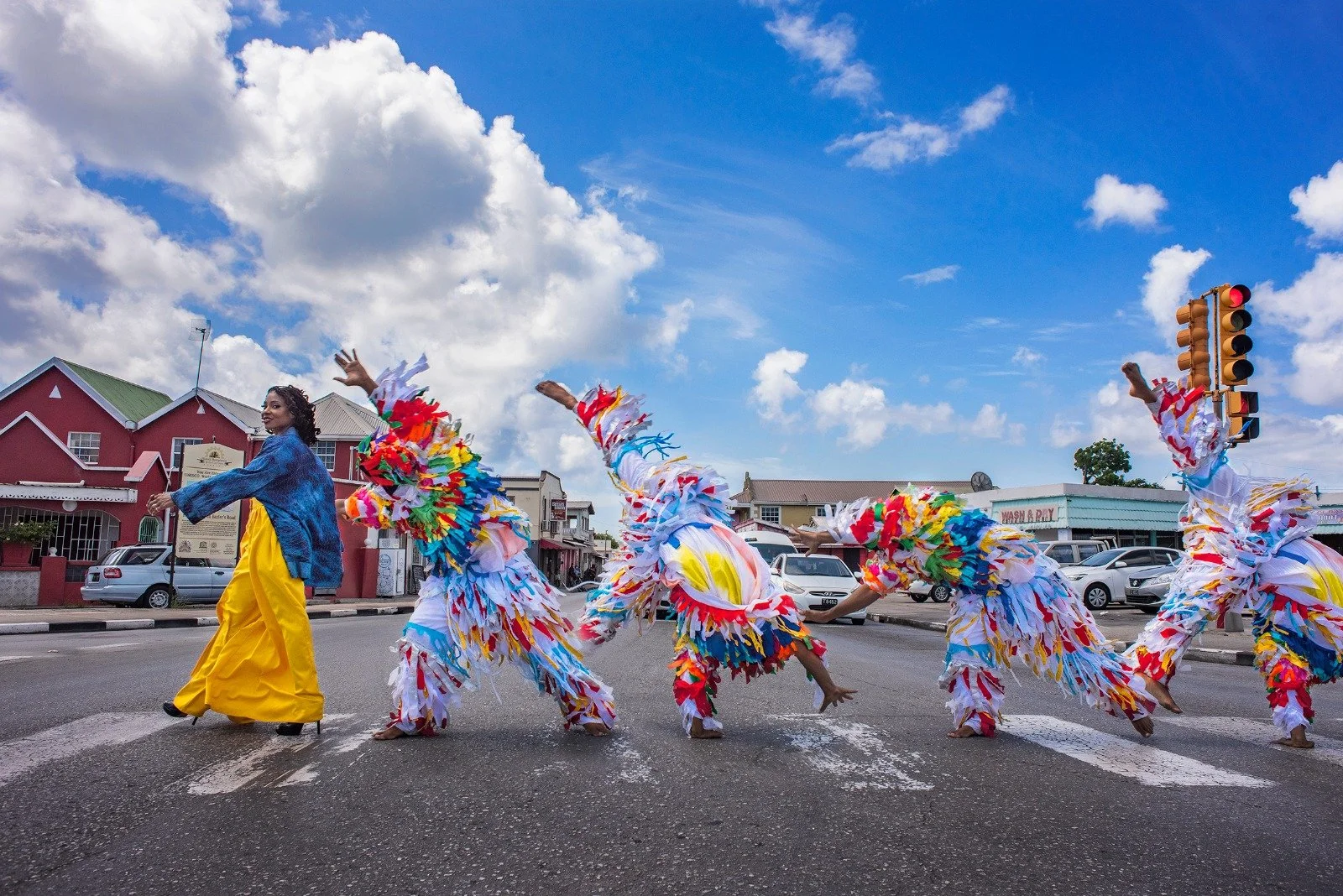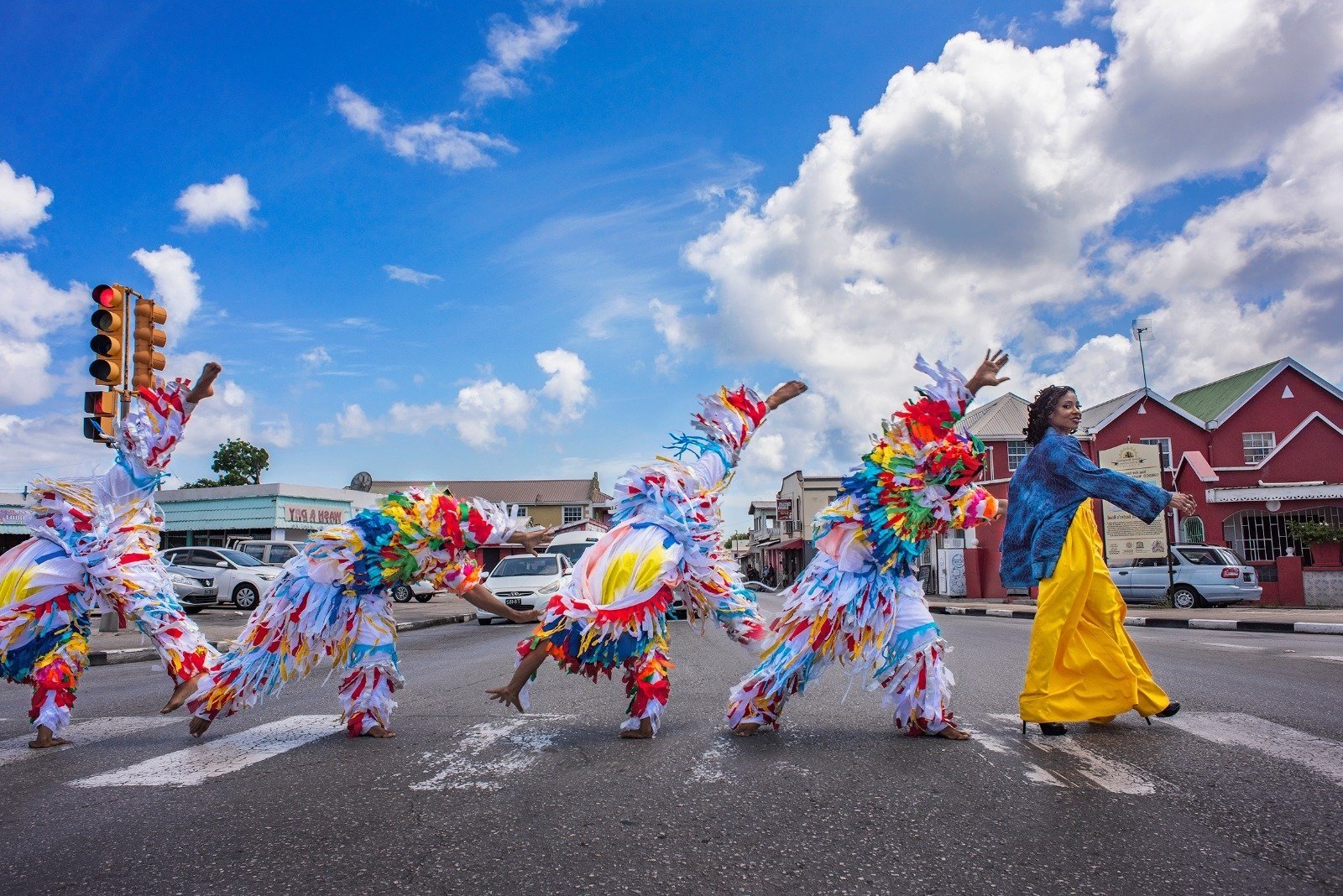“Let Me Entertain You” is A Gift. Not A Promise
luxury Patronage, the future of cultural preservation
It’s time to elevate what we’ve been sitting on all along.
innovation, transculturation & cultural resilience
Hi Guys,
Those are three big a** words (even though Cultural Resilience is 2 words but don't come for me lol), if you keep reading you’ll see why they work.
It’s Christmas time and Know Your Caribbean, my favourite West Indian thought leader and Caribbean historian, shared a post that reminded me, outside of the usual cultural festival, this is the time of year most of our Folk characters come out to play. As she notes:
“Our enslaved ancestors were scarcely given time to dance and sing, except on [Christ]mas and Boxing Day...this is when they tapped most into their heritage, and we do it still today”
An eyewitness account reads:
“Scarcely was our worship closed, before the heathen negroes on the estate began to beat their drums, to dance, and to sing, in a most outrageous manner. The noise lasted all night, and prevented us from falling asleep.”
- Moravian Missionary, Jamaica 1812
This eyewitness account teaches us 2 things.
Our ancestors had the ability to find joy in any situation, and to hell with you are your damn sleep.
We are the embodiment of innovation. Do you see the date on that eyewitness account? We were a people removed from all we knew and lived in a condition that repressed our heritage. Yet, we still found ways to preserve, celebrate and enjoy our culture from generation to generation. Repackaging, negotiating, reinventing and innovating, inevitably creating something new from the old.
… and it’s still here 400 years later
This is significant. We lament the atrocities of our history but rarely do we celebrate its triumphs. The existence of our creolised languages, indigenous music, crafts and most spectacularly our Folk Characters are a living testament to our cultural resilience. We are exceptional, a melting pot comprised of; (West) African, Asian, East Indian, Amerindian intermingling with Sephardic Jew, Spanish, English, Irish, Scot, Dutch and Portuguese. With transculturation taking place as each new culture entered the Caribbean.
According to Stuart Hall in his lecture titled “Negotiating Caribbean Identities” “[Caribbean people] became subject at once to complex processes of assimilation, translation, adaptation, resistance [and] reselection…”. This process has created a region as diverse as they are talented. Our diversity is not only seen in our ethnic makeup but our cultural crafts, and is quite literally brought to life in something as simple (or not so simple) as our Folk Characters.
putting the folk back into our character
I speak of the Folk Characters as they are living representations of all we’ve been through and speak to the ways we have preserved our culture through oral traditions and generational knowledge. Now, we are entering a new era and that generational knowledge is no longer enough. I believe it’s time to put the Folk back into our Character. Putting our people and our stories back into the West Indian soul and lifestyle. To preserve, save and elevate our culture. So breaking it down:
When we hear “Folk” in a Caribbean context we think “relating to traditional art or culture” but it also refers to “People in General”. According to the Merriam-Webster Dictionary it also means:
A certain kind, class, or group of people
The persons of one's own family
The great proportion of the members of a people that determines the group character and that tends to preserve its characteristic form of civilization and its customs, arts and crafts, legends, traditions, and superstitions from generation to generation.
And an archaic definition which I truly love, “a group of kindred tribes forming a nation”.
When we hear the word “Character” we think of “the mental and moral qualities distinctive to an individual” or in the Caribbean context “a person in a novel, play, movie [or costume]”. Merriam-Webster tells us it also means:
One of the attributes or features that make up and distinguish an individual
A feature used to separate distinguishable things into categories.
The complex of mental and ethical traits marking and often individualizing a person, group, or nation
Reputation
Position & Capacity
But to my favourite definition “moral excellence and firmness”.
There is a reason I went to the effort of breaking down the meaning of Folk and Character. For us as West Indians, when those two words turn up together on a page or in the next advertisement for some cultural event, we think oh here comes someone dressed up in a costume we hope we can name when the children ask (or in Barbados’ case when it comes out in a long skirt and top it must be a mother sally, that’s very incorrect). For others, it’s a quaint piece of living heritage used to entertain and sometimes educate. However, broken down to its bones Folk and Character means people, kindred groups forming one way of conscious thinking, striving toward moral excellence. Holding firm to their values, persevering their position and reputation.
Have we been honouring this truly deep meaning of our character? Have we been preserving our cultural position and reputation? Patrice Washington, a financial expert, life coach and first-generation West Indian, while on the Don’t Keep Your Day Job podcast said:
“I believe that each and every one of us is born with a gift, a talent, a skill, something that we were given freely, to produce well. It is our birthright to use them in the marketplace.”
So ask yourself do you think we have been respecting the real value of our birthright which has been passed down lovingly by a small few from generation to generation, in conditions that should have left us with nothing? Patrice notes many of us have the right gifts but are using them in the wrong place. Our post-emancipation focus on Sun, Sea, sand and “look at the natives” tourism, as well as the locally-focused heritage productions with no educational context might quite simply be the wrong places. This bad placement and lack of education has led to a regional imposter syndrome. Which is robbing us of the opportunity to build our regional wealth not directly dependant on foreign inputs, aka tourist dollars.
We look at the global landscape and assume our crafts are somehow lesser and in so doing give them away at a lesser value. “We do the marketplace a disservice when we don’t honour [by assigning the correct value to] our gifts”. It is only when we travel abroad do realise the high quality of our work. For example, I always remember when I travelled to Las Vegas at 16 with my family, note this is just shy of 20 years ago, we saw a stilt walker simply lift his leg over a woman's head, the audience dramatically sighed, gasped and cheered. We were quite unimpressed. In Barbados we had stilt walkers, this is 20 years ago people, who danced, blew fire, landed in splits and jumped over whole rows of people. Do the math at what their skill is like today? Also, let’s not even get into the story of my American cousins’ who “borrow” my clothing and shoes made by local designers, to pack in their suitcase to never be seen or worn by me again.
Heritage tourism is starting to bridge this gap, highlighting our culture as a draw within itself but it is not opening the real space needed for global impact and our transformation. For this I will share something which I have started learning; there is no transformation without transaction.
Transaction a transformation
We need to reassess how we “sell” our culture. Without creating the right transactions, we will never be able to elevate ourselves to a self-sustaining creative marketplace.
The concept of transaction for transformation is usually shared in personal growth seminars but if anyone needs personal growth right now it’s our region. We are still trying to shake off the last vestiges of colonial thinking and enslaved mindsets. Many life coaches will tell you the thing you were made to feel embarrassed about or got in trouble for is the very thing you should be using to lift yourself up. That thing is our Culture! They made us look down on it because they could see how powerful (read that as healthy, wealthy and wise) it would make us. Just look at Sarah Bartman better known as Hottentot Venus. She was paraded around 18th-century Europe, gawked at and dehumanised for her natural form but sparked the most famous silhouette of female fashion in Europe.
We’re learning to accept and elevate our beauty but the regional subconscious still refuses to see our craftsman and indigenous products as symbols of the highest art form, which should now be elevated to premium status. No, not luxury tourism, luxury patronage. Just look at the example of Sea Island cotton one of the world’s most luxurious fabrics. Here is an excerpt from the article everyone should read:
“When we say that Sea Island Cotton is exclusive, we really mean it. The Italian Albini Group has acquired a partnership with ECCI Cotton (the association between small local farmers and the Ministry of Agriculture) for 100% exclusivity of Sea Island Cotton in Barbados.”
- Orlebar Brown, London
When we fail to value our culture, someone else will demand the proper value for us. We just won’t get to enjoy any of it.
in conclusion, luxury patronage is the future of cultural preservation
As my mother would say “too cheap is too dear”, we have been selling our heritage too cheap for the name of tourism and it is costing us dearly. Just ask any Folk Performer for example what hotels give them (not ask, give) as payment. Even our characters themselves are on the chopping block as hotels determine which ones are safe for their guest’s consumption (post on that to come later).
However, there is an opportunity to right this wrong if we’re willing to take it (Shoot Orlebar Brown is already taking it), the world of Luxury patronage. Luxury is about people appreciating the work of people.
There is a new wave of consumers in the global marketplace. A generation who is holding firm to the concept of sustainability, wanting to know the meaning and values behind each item they come in contact with. They are a new consumer, traveller, global citizen who knows our world has gotten smaller and who believe it is everyone’s duty to take an active interest and support cultures unlike your own.
This new generation is seeking out new brands and people to align themselves with, those who are in keeping with this way of thinking. Here is the transaction and the transformation, by investing in a West Indian craftsman’s work they are investing in those years of knowledge, the history passed down, the story of the labours and trials which created the work they now hold in their hands. The truth of the horrors of history, but also its beauty and resilience. It also creates our own transformaiton, no longer are we saddled with the shame associated with these crafts and histories, we have been given the green light to celebrate the stories and start the reclamation process as a society.
“Let me entertain you. Is a gift, not a promise”
- Life of G.






